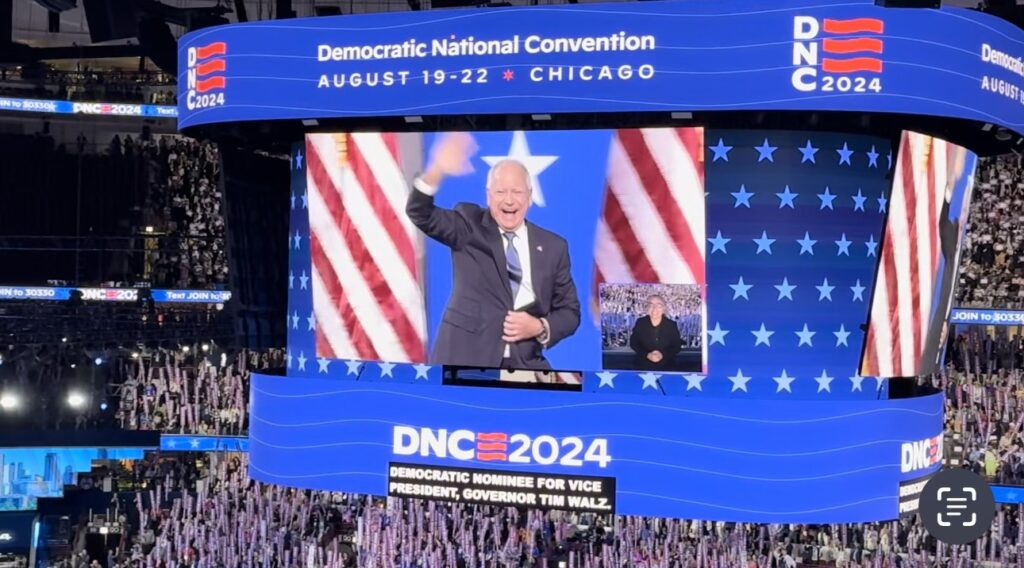
Tim Walz has risen to national prominence in the past couple of weeks since Vice President Kamala Harris, the Democratic nominee for the 2024 Presidential Election, announced him as her running mate on Aug. 6. Walz has a varied resume ranging from his career as a teacher and football coach to serving in the National Guard, all the way to his recent nomination.
Walz accepted the Democratic party’s vice-presidential nomination on Aug. 21 at the Democratic National Convention (DNC), where he expressed gratitude to Harris for the opportunity.
“Thank you, thank you first of all to Vice President Harris. Thanks for putting your trust in me. And for inviting me to be part of this incredible campaign,” Walz said, as the crowd roared, holding ‘Coach Walz’ banners roared in applause.
Here’s what you need to know about the Democratic vice-presidential nominee:
Background
Born in West Point, Nebraska, Walz enlisted in the Army National Guard when he was 17, where he went on to serve for 24 years. After graduating college in 1989, he held a year-long teaching position in China. He started working as a high school geography teacher and football coach after returning from China, retiring from teaching and the National Guard in 2005 to pursue his political career.
He has credited his rural upbringing for his values.
“A town that small had services [schools and hospitals] like that and had a public school with a government teacher that inspired me to be sitting where I’m at today. Those are real stories in small towns,” Walz said in an interview with the New York Times.
In 2006, he won his first term in the U.S. House of Representatives, where he would go on to serve for another five terms.
He was elected the 41st governor of Minnesota in 2018, and he was reelected in 2022.
Achievements as Governor:
Walz’s political career is marked by his commitment to progressive values. During his time in Congress, he often worked across party lines to achieve bipartisan solutions.
Walz consistently supported issues such as veterans’ affairs, education, minimum wage and healthcare. As a former teacher, education reform has been a central theme of his platform, advocating for increased funding for public schools and affordable higher education.
While serving as governor of Minnesota, Walz has implemented significant reforms across various sectors. His administration made the largest investment in public education in state history, expanded voting rights, and established fundamental protections for reproductive and gender-affirming care.
Payton Garcia, a sophomore honors economics major at Howard who comes from a family of public school teachers in Chicago expressed his passion for investing in education.
“Teachers are our greatest community leaders, in my opinion. They educate us on right and wrong, justice and injustice, and drive future generations,” he said.
Garcia believes Walz’s experience as a public school teacher may be beneficial.
“I have always highly revered educators,” he said. “I don’t necessarily feel this diminishes his ability to lead in Minnesota and may actually contribute to it.”
Walz’s leadership during the COVID-19 pandemic drew both praise and criticism. He implemented strict public health measures early in the pandemic, such as mask mandates and stay-at-home orders.
However, these measures also sparked backlash from conservative groups and some business owners, who argued that the restrictions were too severe and economically damaging.
Walz also faced criticism from the Republicans for not calling upon the National Guard quickly enough when protests erupted into riots during the murder of George Floyd in 2020.
Lia Leven, a senior supply chain management major at Howard whose family is from Minnesota said, “With the George Floyd and BLM protests, I feel like he could have handled it better. After George Floyd was murdered, people rioted and protested all over the cities. Having people destroy the cities and small-owned businesses rubbed people—especially me—the wrong way.”
After the initial setback, he promptly set the National Guard on duty once he had a plan in place.
“However, I feel he redeemed himself after the first impact. He was able to call in help and have community,” Leven said. “The situations he was put in were hard and I think it’s important I understand the significance and the different avenues he could’ve approached.”
The governor has a nuanced stance on gun control policy as well.
A lifelong gun owner and supporter of Second Amendment rights, he had a shift in perspective after multiple mass shootings in the country’s history.
He has since proposed an assault weapons ban and endorsed gun control initiatives.
Garcia shared his thoughts on what he hoped Walz would address nationally if elected.
“As vice president, I would really hope that Tim Walz would address ongoing gun violence and gang-related issues that have been persistent in Black communities in the Midwest,” Garcia said. “I also hope he will tackle unnecessary arrests and consider reform—or even some level of abolition—regarding police training programs.”
Walz’s administration has prioritized workers’ rights, infrastructure, and housing with landmark legislation and funding. Additionally, they have worked to lower prescription drug costs, reduce child poverty, support workforce development, and protect consumer and senior rights.
His administration also emphasized environmental initiatives, including efforts to transition Minnesota to 100 percent clean energy by 2050.
Many young voters are drawn to progressive causes such as climate action, criminal justice reform, and student debt relief—issues they hope Walz and Harris will prioritize in their campaign, according to U.S. News and World Report.
“I have seen that his administration is focused on the issues young people will have to fight for in the near future,” Garcia said.
Copy edited by Camiryn Stepteau









